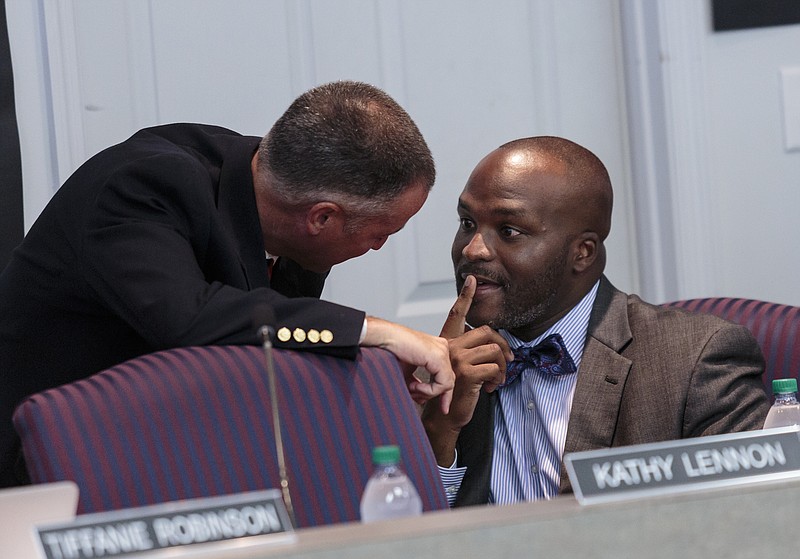Newly installed schools Superintendent Bryan Johnson told the Hamilton County Board of Education on Thursday that he will work with his team, principals and the community over the next month on a plan to improve the district's five struggling schools.
That came after nearly an hour of discussion among board members about the state's Partnership Zone proposal, with the majority saying the state shouldn't intervene in the district's five chronically underperforming schools.
"Let's develop a comprehensive plan, so we can go back [to the state] and say, 'This is what we see as a plan, and let's figure out how we partner to move our schools forward,'" Johnson said. "I think at the core of everything, everybody wants to move student achievement. That's the common ground."
Tennessee Education Commissioner Candice McQueen asked the board last week to decide by the end of August whether it wants to create a Partnership Zone with the state to support the five schools. If not, she said, at least some of the schools likely will be placed in the state-run Achievement School District.
McQueen previously said the state is obligated to intervene, as Brainerd High, Dalewood Middle, Woodmore Elementary, Orchard Knob Middle and Orchard Knob Elementary have struggled for more than a decade to make academic gains under Hamilton County's leadership and rank in the bottom 5 percent of schools statewide.
It's unclear whether the state will accept Johnson's plan, but many board members supported the idea of the district developing an alternative plan.
The two school board members who represent the five schools, Tiffanie Robinson and Karitsa Mosley Jones, said during the board's meeting Thursday night that they have concerns about the Partnership Zone but are not against it. Both agree something needs to be done to improve outcomes, but they are against a state takeover.
Mosley Jones said students attending the five schools, known as priority or iZone schools, deserve better than what they've received in the last 15 years. She said if the board turns down the Partnership Zone, it needs to have a solution for the schools the state will accept.
"We can't say 'no' without a plan," she urged the board.
Robinson agreed, saying those schools, which serve a large share of students living in poverty, have struggled for too long and that state of affairs can't be allowed to continue. She said the Partnership Zone seems like the state wanting to help and not take over.
But the remainder of the board voiced a slew of complaints, criticizing the state's plan and questioning its ability to help.
School board member Kathy Lennon said she doesn't like that the state is asking the board to make a decision before it has seen standardized testing data from the last academic year.
"I don't trust, right now, the state," she said.
Steve Highlander, chairman of the school board, questioned the validity of the state's testing data because of the tumultuous rollout of TNReady in 2016 and the cancellation of the test for grades 3-8.
School board member Joe Wingate said he's frustrated the state hasn't given the board a proposed budget for the Partnership Zone.
"We still don't know how the funding is going to work, and that is very, very concerning to me," he said.
Rhonda Thurman, a member of the board, argued the Partnership Zone is not legal. The plan calls for the creation of an appointed school board, but state law says board members must be elected.
Local educators are invested in those schools, she said, praising the principals' hard work and dedication.
"I know the principals are busting their rear ends every day," she said. "I don't know what the state is going to do to come in and make things better."
After the discussion, state Rep. JoAnne Favors, D-Chattanooga, told the board not to accept the Partnership Zone or the Achievement School District, applauding them for allowing Johnson to develop a plan for the schools.
McQueen visited Hamilton County several times last week, meeting with board members, educators and community stakeholders about the Partnership Zone.
If the board approved the plan, she said, the state would work with the district to create a mini-district for the five schools, which would have its own director and board. The purpose of the Partnership Zone is to give the schools increased autonomy and support, she said.
McQueen originally proposed the state appoint 60 percent of the seven- to 10-member Partnership Zone board, leaving 40 percent for local school district representatives. But she said last week the ratio isn't set in stone, and that 100 percent of the Partnership Zone's board will represent Hamilton County.
The state would work with the Legislature to change the law to allow for an appointed board, she said.
The Partnership Zone also would not cost the school system more money, McQueen added, as the proposed budget is based on the state's per-pupil funding. If additional funding for the Partnership Zone is needed, the state would tap state, federal and philanthropic dollars, she said.
Johnson reminded the board during the meeting that everyone needs to be urgently working to boost student outcomes.
"There are 2,300 students not getting what they need. That is the bottom line," he said. "We've got an obligation as a board, an obligation as a community to ensure these students get what they need."
And in addition to the five iZone schools, Johnson said, work must also be taking place in the county's other 11 schools that rank in the bottom 10 percent of schools statewide.
Contact staff writer Kendi A. Rainwater at krainwater@timesfreepress.com or 423-757-6592. Follow her on Twitter @kendi_and.

